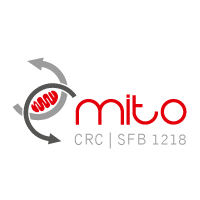MITOchats Programme
Wednesday, 10th July
MITOchats Satellite Event for early career stage researchers
Registration 1 p.m.
2:00 – 3:30 p.m. Satellite Session 1
Timothy Wai, Department of Cell Biology & Infection, Pasteur Institute Paris, France
Ricarda Richter-Dennerlein, Department of Cellular Biochemistry, University of Göttingen,
Germany
3:30 – 4:00 p.m. Coffee break
4:00 – 5:30 p.m. Satellite Session 2
India C. Severin, Brain Health Department at Nestlé Research Nestlé Institute
of Health Sciences S.A., Lausanne, Switzerland
Tatiana Tiago, Laboratory of Prof. Serena Carra, University of Modena and Reggio Emilia,
Modena, Italy
5:45 p.m. Networking get-together (registration in advance required)
Satellite Event for Early Career Stage Researchers
Thursday, 11th July
MITOchats Symposium Day 1
Registration opening at 08:00
08:45 – 10:15 a.m. Mitochondria in ROS Signalling and Ageing
Adam Antebi, Max Planck Institute for Biology of Ageing, Cologne, Germany
NFYB-1 regulates mitochondrial function and longevity
via lysosomal prosaposin
Elizabeth Veal, Institute for Cell and Molecular Biosciences, University of Newcastle,
Newcastle upon Tyne, United Kingdom
Unravelling the who, when, where and how of peroxide-signalling
Selected short talk 1
Caterina Tezze, Dulbecco Telethon Institute at Venetian Institute of Molecular Medicine,
Department of Biomedical Science, University of Padova, Padova, Italy
OPA1 orchestrates precocious senescence, degeneration of multiple organs and premature death through inflammation and
metabolic changes
Selected short talk 2
Ana Bratic, Max Planck Institute for Biology of Ageing, Cologne, Germany
Mutations of mitochondrial DNA are not major contributors to ageing
of fruit flies
10:15 – 11:00 a.m. Coffee break (with poster mounting)
11:00 a.m. – 12:30 p.m. Mitochondria and Homeostasis
Thomas Langer, Max Planck Institute for Biology of Ageing, Cologne, Germany
Metabolic repurposing of mitochondria by proteolysis
Chris Meisinger, Institute for Biochemistry and Molecular Biology, University Freiburg,
Germany
Signalling pathways targeting the mitochondrial protein import machinery: control of biogenesis, cell cycle and metabolism
Selected short talk 3
Roberta Peruzzo, Department of Biology, University of Padova, Padova, Italy
Impaired mitochondrial ATP production downregulates Wnt signaling
via ER stress induction
Selected short talk 4
Piotr Bragoszewski, Centre of New Technologies, University of Warsaw, Warsaw, Poland
Regulation of mitochondrial protein biogenesis by cytosolic
protein quality control machinery
12:30 – 2:30 p.m. Poster Session with finger food
2:30 – 4:00 p.m. Physiological Role of Mitochondria
Timothy Wai, Department of Cell Biology & Infection, Pasteur Institute Paris, Paris, France
Mitochondrial dynamics and disease
Michael Duchen, Cell and Developmental Biology, University College London, Consortium for
Mitochondrial Research, London, United Kingdom
Linking mitochondrial dysfunction to neurodegeneration:
Impaired mitochondrial bioenergetic capacity sensitises neurons
to calcium overload
Selected short talk 5
Liliana Rojas-Charry, Institute of Neuropathology, Universitätsklinikum Hamburg-Eppendorf,
Germany
Presenilin 1 Mutations affect Mitochondrial Morphology and Function in Familial Alzheimer´s Disease
Selected short talk 6
Julien Delezie, Biozentrum, University of Basel, Switzerland
Circadian control of mitochondrial function in mouse skeletal muscle
4:00 – 5:00 p.m. Coffee break with poster session
5:00 – 6:30 p.m. Mitochondrial Gene Expression
Ricarda Richter-Dennerlein, Department of Cellular Biochemistry, University of Göttingen,
Germany
Ribosome biogenesis in human mitochondria
Dusanka Milenkovic, Max Planck Institute for Biology of Ageing, Cologne, Germany
The in vivo role of the mitochondrial DNA nuclease MGME1
Selected short talk 7
Julia Boix, Institute of Vegetative Physiology, University of Cologne, Cologne, Germany
The role of HIF1a in skin: trying to preserve epidermal homeostasis during mitochondrial dysfunction
Selected short talk 8
Désirée Schatton, Institute for Genetics, University of Cologne, Cologne, Germany
The role of the CLUH/astrin/kinastrin complex in mitochondrial biogenesis
6:45 p.m. Symposium Dinner (registration in advance required)
Friday, July 12th
MITOchats Symposium Day 2
09:00 – 10:30 a.m. Mitochondrial Structure
Ulrich Brandt, Radboud Center for Mitochondrial Medicine, Radboud University Medical
Center, Nijmegen, Netherlands
Mitochondrial complex I – an astounding molecular machine
of ancient origin
Thomas Meier, Department of Life Sciences, Imperial College of London, London,
United Kingdom
Structures of rotary ATPases and their role in human health and disease
Selected short talk 9
Rubén Quintana-Cabrera, Institute of Functional Biology and Genomics,
University of Salamanca, Salamanca, Spain
ATP synthase partners to control mitochondrial ultrastructure
Selected short talk 10
Giovanni Rigoni, Department of Biology (Vallisneri), Università degli Studi Di Padova,
Padova, Italy
Dissecting the dual role of ATAD3A in nucleoids stability and
cristae ultrastructure
10:30 – 11:00 a.m. Coffee break
11:00 a.m. – 12:30 p.m. Mitochondrial Dynamics and
Subcellular Interactions
Margaret Ashcroft, Department of Medicine, Cambridge University, Cambridge,
United Kingdom
Mitochondria and Hypoxia Signalling
Benoît Kornmann, Department of Biochemistry, University of Oxford, Oxford,
United Kingdom
Organelle contact sites: a new layer in the organization
of Eukaryotic cells
Selected short talk 11
Keiko Iwata, Research Center for Child Mental Development, University of Fukui, Fukui,
Japan
Exploring the novel role of mitochondrial dynamics in schizophrenia
Selected short talk 12
Bruna Garcia, Max Planck Institute for Biology of Ageing, Cologne, Germany
Mitofusin 2 regulates cholesterol homeostasis
12:30 – 2:00 p.m. Lunch break
2:00 – 3:45 p.m. Metabolic Regulation in Health and Disease
Jared Rutter, Department of Biochemistry, University of Utah, Salt Lake City, USA
Mitochondria, metabolism and the control of cellular decisions
Selected short talk 13
Miriam Valera-Alberni, Nestlé Research - Nestlé Institute of Health Sciences SA,
École Polytechnique Fédérale de Lausanne, Lausanne, Switzerland
The Impact of Mitochondrial Fission on Metabolic Adaptation
Selected short talk 14
Mauro Corrado, Department of Immunometabolism, Max Planck Institute of Immunology
and Epigenetics, Freiburg Im Breisgau, Germany
Cardiolipin controls CD8+ memory T cell metabolism and function
Selected short talk 15
Andromachi Pouikli, Max Planck Institute for Biology of Ageing, Cologne, Germany
Citrate Carrier Links Cellular Metabolism to Histone Acetylation During Ageing of Mesenchymal Stem Cells
Closing remarks
